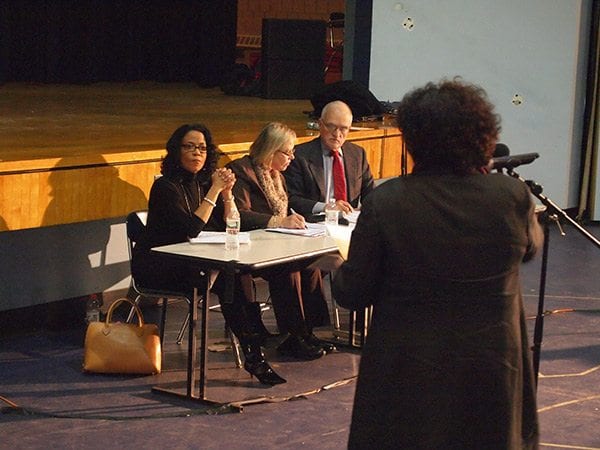
Discussion of jobs and wages dominated Mayor-elect Marty Walsh’s first public hearing on economic development Monday night at English High School.
Labor activists, nonprofit leaders and small business advocates called for an increased emphasis on creating jobs and economic development opportunities for Boston’s workers and businesses.
Retired long-time union member Mike Gallagher addressed the living wage issue right at the start of the hearing, calling out the city’s efforts to ensure its living wage regulations. “We need better enforcement of the ordinance,” Gallagher said.
Boston passed The Living Wage Ordinance in 1998 to make sure that employees of vendors who contract with the city earn an hourly wage that is sufficient for a family of four to live on or above the poverty line. The current Living Wage is $13.76 an hour, and will stay in effect until June 30, 2014. The living wage is subject to an increase each July 1.
Gallagher called for the establishment of a specific official in City Hall to enforce the living wage and make sure that all contracts approved through the city have the necessary living wage requirements in place.
Hakim Cunningham of the Boston Workers Alliance was another who called for more enforceable living wage agreements. His suggestion was to have a specific hiring committee as part of the Boston Redevelopment Authority that could address living wage issues.
Several of those who spoke on the living wage issue suggested that the city fine companies who do not comply with the living wage ordinance.
Edwin Argueta from Massachusetts Jobs with Justice called for more attention to the city’s dealing with multinational corporations, especially ones that are criticized for how they treat or pay employees. He asked for Boston to create a standard for dealing with such businesses and enforcement to hold them to these standards.
“We need to consider through economic development who we are creating wealth and development for. And I think for too long we have been developing wealth for multinational corporations and not the people,” Argueta said.
“We think one of the biggest challenges for Boston is creating more jobs,” said Jim Klocke, executive vice president of the Greater Boston Chamber of Commerce.
However, Klocke pointed out that Boston’s unemployment rate is in the middle of the scale compared to other big cities in the country, so the efforts so far are having some success. He called for a continual emphasis on creating jobs for Boston’s residents.
Mike Iceland, executive director of West Roxbury Main Streets, asked for an emphasis on creating jobs and development throughout the city and not just in downtown Boston or high wealth areas. He said Boston can work better with all Main Street organizations — or similar groups — to accomplish this because these organizations know what their neighborhoods need.
“I want to make sure economic development is a topic for all the parts of the city,” Iceland said. “To empower us to work with the neighborhoods is really important.”
The public hearing is part of a slate of similar events schedule for this month and next month aimed at exposing Walsh’s Transition Committee to issues that are being examined by designated working groups as the Mayor-elect prepares for the beginning of his first term running the city. Walsh has asked the working groups to collect ideas from the public hearings and present them to him once he takes office in 2014. Working groups has already been established to cover areas that include: arts and culture; basic city services; economic development; education; energy, environment and open space; housing; human services; public health; public safety; transportation and infrastructure; and youth.
The economic development hearing at English High was moderated by the heads of the economic development working group committee: Donna Cupelo, regional president at Verizon, and Pat Moscaritolo, president and CEO of the Greater Boston Convention & Visitors Bureau. Committee member Beth Williams, president and CEO of Roxbury Technology, also led the hearing.
According to Moscaritolo, the economic development working group will meet again this week to discuss the major issues that came up at the hearing, they will then have a follow up meeting next week to determine a list of the main themes that need to be addressed and started to make their recommendations, which will go to Mayor-elect Walsh.
On the living wage issue, Moscaritolo said he does not know yet how the working group can address this, but clearly it is an issue that must be discussed by the committee.
“One of the people said there were only three people that are monitoring this and one of the recommendations was it should be audited or that kind of thing. That is very logical, but that takes money. I assume that you would have to figure out a way [to do that],” he said.
Moscaritolo pointed to the Sarbanes-Oxley Act as a successful way that businesses are audited to ensure compliance to government regulations as an example of the kind of thing that can work to address such issues.
One thing that Moscaritolo said struck him from the hearing was that most of those who spoke did not ask for money, but just for the mayor’s support in what they are trying to do. He added that he was also impressed by the will and desire to improve Boston.
“The things I take away from this whole process is the passion of the community, who want to come out and talk about these issues. They see this as a new opportunity starting with a new administration to address these issues. And they do it in a really interesting way because they are not criticizing what is going on, but they are just saying now that you have a new set of eyes these are some of the things that the mayor might want to look at,” Moscaritolo said. “The common denominator that I am seeing throughout all of this is passion, commitment, wanting to help and make things better.”






